

Unsolicited Electronic Messages Bill — Second Reading. Second Reading Hon DAVID CUNLIFFE (Minister for Information Technology) : I move, That the Unsolicited Electronic Messages Bill be now read a second time.
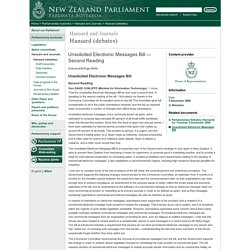
In speaking to the second reading of the bill, I first extend my thanks to the Commerce Committee for its excellent work on the bill. The committee gave full consideration to all of the public submissions received, and the bill, as reported back, incorporates a number of changes that reflect those submissions. Unsolicited electronic messages, more commonly known as spam, were estimated to comprise approximately 80 percent of all email traffic worldwide when this bill was first mooted. Since then the flood of spam has only got worse. The Unsolicited Electronic Messages Bill is an important part of the Government’s strategy to curb spam in New Zealand.
I now turn to consider some of the key provisions of the bill; firstly, the commencement and preliminary provisions. Part 3, “Enforcement provisions”, proposes a civil enforcement regime. High stakes in New Zealand's war against spam. Unsolicited mail far more dangerous than mere nuisance, with cyber-criminals able to hold firms to ransom.

It's being described as a war, an arms race, an unseen struggle where the stakes are being raised and the weapons redefined each minute. In New Zealand, the ramparts are constantly being tested by attacks numbering in the tens of millions each hour. The odds are becoming increasingly stacked against people like Peter Merrigan, but major battles are still being won. Mr Merrigan is a senior investigator at what might be called the A-Team of the spam war: the Department of Internal Affairs' Electronic Messaging Compliance Unit (EMCU).
The enemy they and other agencies fight is often a faceless cyber-criminal, sitting in a faraway country, hidden behind layers of electronic protection. 0821.pdf. Internal-Affairs-v-Image-Marketing-Group-Ltd. Key Differences between US and Canadian Anti-Spam Laws. April 2014 Privacy Bulletin.
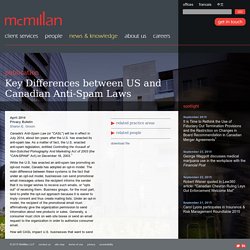
Unsolicited Electronic Messages Act 2007 No 7 (as at 05 December 2013), Public Act Contents. European Union. 2005.2.2.uoltj.Ng.447-491. Srs-ewi-paper-final. 05_031005_cobos. Information Economy. 77_edwardscanningthespam00. v16i1-privacy-and-the-spam-act. Kellet. Anti-Spam. 44047583. Why M3AAWG? Who we are: The Messaging, Malware and Mobile Anti-Abuse Working Group (M3AAWG) is where the industry comes together to work against botnets, malware, spam, viruses, DoS attacks and other online exploitation.
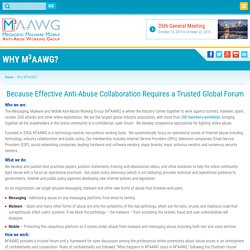
We are the largest global industry association, with more than 200 members worldwide, bringing together all the stakeholders in the online community in a confidential, open forum. We develop cooperative approaches for fighting online abuse. Founded in 2004, M3AAWG is a technology-neutral, non-political working body. We systematically focus on operational issues of Internet abuse including technology, industry collaboration and public policy.
What we do: We develop and publish best practices papers, position statements, training and educational videos, and other materials to help the online community fight abuse with a focus on operational practices. Summary Report of the ITU-T World Conference on International Telecommunications - The Internet Protocol Journal, Volume 16, No. 1. From 3–14 December, 2012, 151 Member States of the International Telecommunication Union (ITU) met in Dubai [0] at the World Conference on International Telecommunications (WCIT-12) [1] to revise the International Telecommunication Regulations (ITRs), a treaty-level document establishing policies governing international telecommunications services.
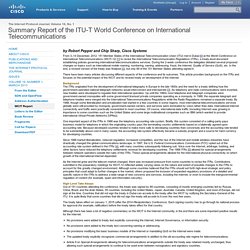
During the 2-week conference the delegates debated several proposed changes on topics such as international mobile roaming, numbering, naming, addressing, fraud, the Internet, Quality of Service (QoS), etc. In the end, a revised version of the treaty was finalized [2], but only 89 of the 151 Member States attending signed it. There have been many articles discussing different aspects of the conference and its outcomes. This article provides background on the ITRs and focuses on the potential impact of the WCIT and its revised treaty on development of the Internet. Background. Cybercrime2014. ITU and Internet Society collaborate to combat spam. Spam accounts for 80 per cent of global e-mail traffic Busan, 06 November 2014 – ITU and the Internet Society today signed a letter of agreement to collaborate on combating the global problem of spam.
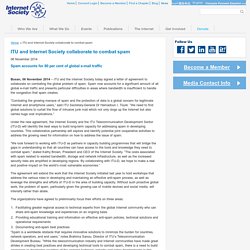
Spam now accounts for a significant amount of all global e-mail traffic and presents particular difficulties in areas where bandwidth is insufficient to handle the congestion that spam creates. “Combating the growing menace of spam and the protection of data is a global concern for legitimate Internet and smartphone users,” said ITU Secretary-General Dr Hamadoun I. Touré. “We need to find global solutions to curtail the flow of intrusive junk mail which not only clogs up the Internet but also carries huge cost implications.” Under the new agreement, the Internet Society and the ITU Telecommunication Development Sector (ITU-D) will identify the best ways to build long-term capacity for addressing spam in developing countries. The London Action Plan. On October 11, 2004, government and public agencies from 27 countries responsible for enforcing laws concerning spam met in London to discuss international spam enforcement cooperation.

At this meeting, a broad range of spam enforcement agencies, including data protection agencies, telecommunications agencies and consumer protection agencies, met to discuss international spam enforcement cooperation. Several private sector representatives also collaborated in parts of the meeting. Global cooperation and public private partnerships are essential to spam enforcement, as recognized in various international fora. 45a3afab-3e1d-4d43-b8d4-b6d73cfbd201. Beehive.govt.nz - Anti-Spam Bill Introduced. Information Technology Minister David Cunliffe has today tabled in Parliament the Unsolicited Electronic Messages Bill.
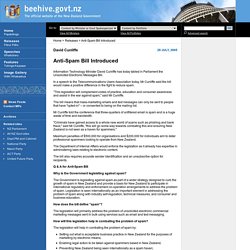
In a speech to the Telecommunications Users Association today, Mr Cunliffe said the bill would make a positive difference in the fight to reduce spam. Unsolicited Electronic Messages Act 2007 No 7 (as at 05 December 2013), Public Act Contents. Anti-Spam. Sign In. Study on the effectiveness of anomaly detection for spam filtering. Laboratory for Smartness, Semantics and Security (S3Lab), University of Deusto, Avenida de las Universidades 24, 48007 Bilbao, Spain Received 5 November 2011, Revised 24 May 2013, Accepted 15 February 2014, Available online 25 March 2014 Choose an option to locate/access this article: Check if you have access through your login credentials or your institution Check access doi:10.1016/j.ins.2014.02.114 Get rights and content Abstract Spam has become an important problem for computer security because it is a channel for spreading threats, including computer viruses, worms and phishing.
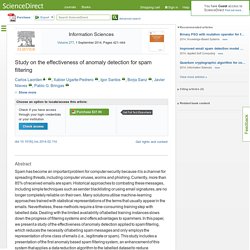
Canada's Law on Spam and Other Electronic Threats - Home - Canada's Anti-Spam Legislation. Complying with Canada's New Anti-Spam Legislation: Five Hot Tips for Startups. Spam: Unwanted Email and Text Messages – FCC Complaints. Spam – or unwanted messages to email accounts and texts to mobile phones and other mobile devices – can be intrusive and costly.
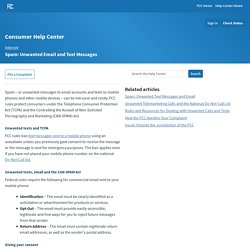
FCC rules protect consumers under the Telephone Consumer Protection Act (TCPA) and the Controlling the Assault of Non-Solicited Pornography and Marketing (CAN-SPAM) Act. Unwanted texts and TCPA FCC rules ban text messages sent to a mobile phone using an autodialer unless you previously gave consent to receive the message or the message is sent for emergency purposes. The ban applies even if you have not placed your mobile phone number on the national Do-Not-Call list. Canada’s Anti-Spam Law (CASL) FAQ. Canada's Anti-Spam Law (CASL) is one of the toughest laws of its kind in the world, making its application and interpretation particularly thorny.
Here we answer some of your frequent questions about both the new law and Industry Canada’s revised regulations. How will CASL impact your business? To discuss this challenge, feel free to contact us. Commercial Electronic Messaging. Ezine - Simpson Grierson. 23 Feb 2012 Anti-Spam Act Now Covers Faxes Following an amendment to the Unsolicited Electronic Messages Act 2007 (Anti-Spam Act), unsolicited commercial faxes are now a prohibited form of "spam" in New Zealand.
Accordingly, businesses using fax messages for marketing purposes would be well-advised to review their fax marketing practices to ensure they comply with the Anti-Spam Act's requirements. This article revisits the key provisions of the Anti-Spam Act, and discusses the practical implications of the recent amendment. Avoiding Spam. It is better to protect yourself from becoming the target of spam than deal with it later. Once your address is on a spammer’s mailing list it can be difficult to get it removed. Here are some tips to avoid spam:See also: Email Spam Safeguard your email address when online Use an email address that cannot be easily ‘guessed’ by software that spammers use to automatically generate addresses. Give your email address to people and organisations you know and trust. Use a separate email address for posting to newsgroups, bulletin boards and for performing online transactions that may involve your address being passed on to a third party. Don’t open emails that seem to be from a dubious source, and don’t open email attachments you weren’t expecting.
Safeguard your email address when posting on a website If you want to include your contact details on a website, but don’t want to be flooded with spam, you have several options: High stakes in New Zealand's war against spam.